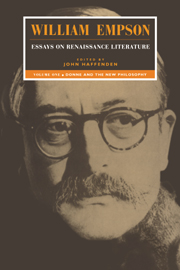Book contents
- Frontmatter
- Contents
- Preface
- Sources and acknowledgements
- Introduction by John Haffenden
- 1 Donne and the rhetorical tradition
- 2 Donne the space man
- 3 Donne in the new edition
- 4 Rescuing Donne
- 5 Donne's foresight
- 6 Copernicanism and the censor
- 7 Thomas Digges his infinite universe
- 8 Godwin's voyage to the moon
- Appendix on Galileo
- Notes
- Index
7 - Thomas Digges his infinite universe
Published online by Cambridge University Press: 01 February 2010
- Frontmatter
- Contents
- Preface
- Sources and acknowledgements
- Introduction by John Haffenden
- 1 Donne and the rhetorical tradition
- 2 Donne the space man
- 3 Donne in the new edition
- 4 Rescuing Donne
- 5 Donne's foresight
- 6 Copernicanism and the censor
- 7 Thomas Digges his infinite universe
- 8 Godwin's voyage to the moon
- Appendix on Galileo
- Notes
- Index
Summary
In 1576, Thomas Digges (1532?–95) reprinted a book by his father Leonard (d. 1571), A Prognostication Everlasting, 85 pages, mostly diagrams and columns of figures, adding at the end 23 pages of his own, mostly letterpress, nearly 10,000 words. His father's part was first published in 1553, and had two reprints before Elizabeth came to the throne; of course, it uses the old astronomy, but the description of that is only a framework; the everlasting forecasts are about such things as the date of Easter and the hours of the tides at the major ports of England (‘Ensample: I desire to know the Full Water at London Bridge, in the year of our Lord 1555, the 6 day of February’). All this remains; then the son remarks coolly that the reader had better know the alternative theory of the planets, and his account is an impassioned defence of it.
This arrangement slipped through the net of the censorship, and Thomas had hoped that it would; but he did not foresee that a stiffening of the censorship would for ever prevent any improvement in his essay; some of it is very fine prose, but the end of it seems casual and off the point. Probably he hurried so as to keep the book in print; he could hardly foresee that Whitgift, who was to stiffen the licensing system, would be made Archbishop in the following year.
- Type
- Chapter
- Information
- William Empson: Essays on Renaissance Literature , pp. 216 - 219Publisher: Cambridge University PressPrint publication year: 1993

